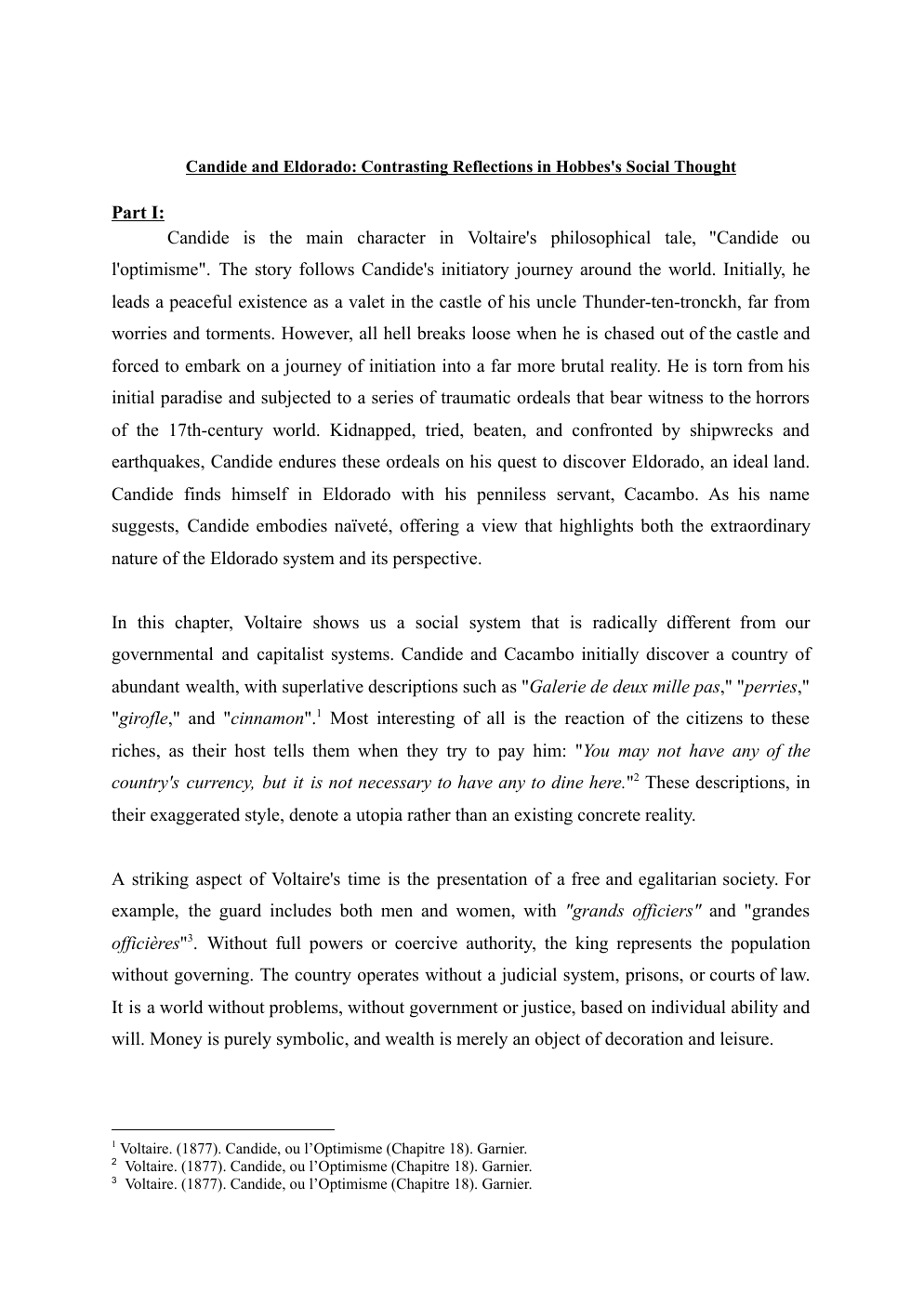Candide and Eldorado: Contrasting Reflections in Hobbes's Social Thought
Publié le 10/12/2023
Extrait du document
«
Candide and Eldorado: Contrasting Reflections in Hobbes's Social Thought
Part I:
Candide is the main character in Voltaire's philosophical tale, "Candide ou
l'optimisme".
The story follows Candide's initiatory journey around the world.
Initially, he
leads a peaceful existence as a valet in the castle of his uncle Thunder-ten-tronckh, far from
worries and torments.
However, all hell breaks loose when he is chased out of the castle and
forced to embark on a journey of initiation into a far more brutal reality.
He is torn from his
initial paradise and subjected to a series of traumatic ordeals that bear witness to the horrors
of the 17th-century world.
Kidnapped, tried, beaten, and confronted by shipwrecks and
earthquakes, Candide endures these ordeals on his quest to discover Eldorado, an ideal land.
Candide finds himself in Eldorado with his penniless servant, Cacambo.
As his name
suggests, Candide embodies naïveté, offering a view that highlights both the extraordinary
nature of the Eldorado system and its perspective.
In this chapter, Voltaire shows us a social system that is radically different from our
governmental and capitalist systems.
Candide and Cacambo initially discover a country of
abundant wealth, with superlative descriptions such as "Galerie de deux mille pas," "perries,"
"girofle," and "cinnamon".1 Most interesting of all is the reaction of the citizens to these
riches, as their host tells them when they try to pay him: "You may not have any of the
country's currency, but it is not necessary to have any to dine here."2 These descriptions, in
their exaggerated style, denote a utopia rather than an existing concrete reality.
A striking aspect of Voltaire's time is the presentation of a free and egalitarian society.
For
example, the guard includes both men and women, with "grands officiers" and "grandes
officières"3.
Without full powers or coercive authority, the king represents the population
without governing.
The country operates without a judicial system, prisons, or courts of law.
It is a world without problems, without government or justice, based on individual ability and
will.
Money is purely symbolic, and wealth is merely an object of decoration and leisure.
1
Voltaire.
(1877).
Candide, ou l’Optimisme (Chapitre 18).
Garnier.
Voltaire.
(1877).
Candide, ou l’Optimisme (Chapitre 18).
Garnier.
3
Voltaire.
(1877).
Candide, ou l’Optimisme (Chapitre 18).
Garnier.
2
It is attractive to consider Voltaire's text beyond the 17th century, for although it was written
to stimulate the pre-revolutionary French generation, it intended to present a social system
based on the collective, independent of conventional economic or governmental structures.
Part II:
In "Leviathan," Hobbes sets out to develop a theory of the state, beginning with an
in-depth analysis of human nature.
Throughout his book, the author demonstrates that man is
fundamentally selfish, malevolent, hostile, and prone to aggression.
Before delving into the
details of the chapter in question, it is essential to understand Hobbes' distinction between the
state of nature and the civil state.
In his view, the state of nature represents, not historically
but conceptually, a state of our society devoid of any system of justice or government.
Hobbes describes this period as a state of chaos, where man is like a veritable animal.
Conversely, in the civil state, Hobbes argues that the presence of a strong government avoids
war and conflict.4 His central thesis is that we should no longer fear God but the state and that
a powerful state is the best way for our society to function.
Chapter 13 of "Leviathan," sets out the portrait of a man and its consequences.
In this state of
nature, Hobbes describes the perpetual competition between human beings for resources and
security.
He points the finger at possession as the main culprit since possessing creates an
environment marked by fear, mistrust, and, consequently, violence.
"Therefore, if any two
men desire the same thing, which they cannot both enjoy, they become enemies."5 According
to Hobbes, individuals only come together to attack or defend themselves, which, in his eyes,
is the very basis of society's violence.
The author identifies the significant causes of conflict among individuals: competition for
gain, distrust for security, and the desire for fame or reputation.
These conflicts lead to war,
which is not limited to fighting but includes a prolonged willingness to fight.
In the absence
of a common power to maintain peace, individuals live in a state of war characterized by
loneliness, brutality, misery, and a short lifespan: "men have no pleasure....
»
↓↓↓ APERÇU DU DOCUMENT ↓↓↓
Liens utiles
- Article - The power of words - Words, a powerful political and social weapon ?
- Commentaire de texte Candide: le palais et la ville d’Eldorado.
- fiche de lecture : A Tale of Two Cultures. Qualitative and Quantitative research in the social sciences
- Les systèmes politiques promus par Aristote dans La Politique, par Machiavel dans Le Prince, par Hobbes dans Le Corps politique et par Rousseau dans Le Contrat social vous semblent-ils rationnels ?
- Les systèmes politiques promus par Aristote dans La Politique, par Machiavel dans Le Prince, par Hobbes dans Le Corps politique et par Rousseau dans Le Contrat social vous semblent-ils rationnels ?


